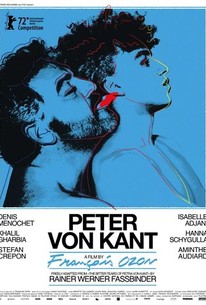Here’s the fourth brief film review of the movie, Peter Von Kant that appeared at the Provincetown International Film Festival in June, returning in person after a two-year hiatus. While not an LGBT festival, there are always plenty of entries that match this magazine’s mission.
François Ozon’s new film was billed as a “Secret Screening” at the festival, as all information about it was embargoed. We knew only that John Waters described it as “a lu-lu,” and that description seems fair enough. To be sure, Ozon’s style in Peter von Kant is nothing like the “low camp” of Waters himself, but the outfits and emotions are so over-the-top that “campy” seems an accurate descriptor. Peter’s personal assistant, for example, is a silent butler who dresses like Charlie Chaplin and robotically carries out his abusive master’s every whim.
The title character is a successful filmmaker who lives in elegant decadence in Paris, where he seems to be having a midlife crisis, bored with his career and mostly drinking and snorting cocaine. In walks Amir on the arm of Peter’s best friend Isabelle, an actress who once starred in his films, and he’s instantly smitten with the adorable, however lost, young man. Amir has no visible skills or experience, which doesn’t prevent Peter from casting him in his next film in a bid to win Amir’s amour. When we rejoin the happy couple nine months later, Amir has become an insufferable brat who appears on magazine covers and barely tolerates Peter, finding him (far from a slender man) physically repulsive.
The film’s structure brings to mind A Star is Born (any version) in which a jaded superstar who’s drinking himself to death discovers an ingénue and launches her career, even as his own prospects are declining. When Amir leaves for good, Peter doesn’t chalk it up to experience (of course) but plunges deeper into drugs and alcohol, culminating in a scene in which his mother, his daughter, and Isabelle converge to witness a meltdown to rival anything that happens in A Star Is Born.
Ozon’s film is based on Rainer Werner Fassbinder’s 1972 film The Bitter Tears of Petra von Kant (based on his play), which had an all-female cast. Just as Petra has been married to a number of men, Peter has apparently been married to at least two women—the daughter who comes home from boarding school is from his “first marriage.” Virtually the entire film is set in Peter’s flat, where a small number of friends and relatives come and go to reveal Peter’s back story and current state of angst. It turns out that Amir, too, is married to a woman, with whom he is still in touch and possibly even in love. The fact that both men have now “gone gay” is not met with any surprise. The idea that gender matters in sexual attraction is treated as a quaint notion in these (satirically observed) postmodern times.






